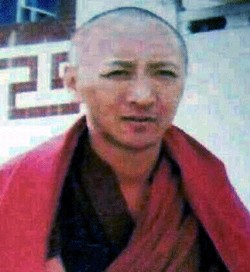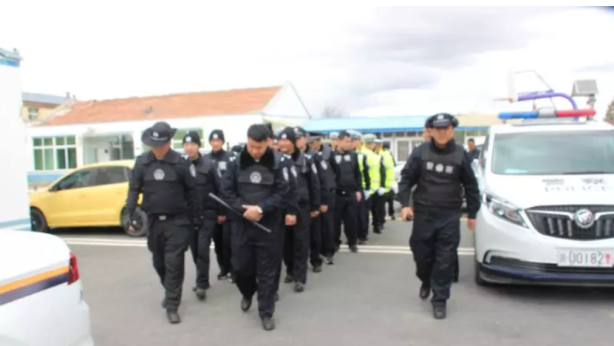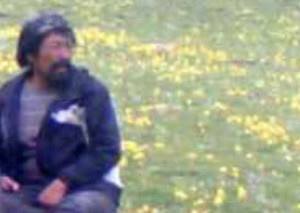Former abbot subjected to secret detention shortly after release from prison

Tibetan Centre for Human Rights and Democracy (TCHRD) is deeply distressed to learn that Lodoe Rabsel, the former abbot of the historic Karma Monastery, was subjected to secret detention for more than a week soon after he was released on completion of his two years and 6 months prison term.
According to information received by TCHRD, Lodoe Rabsel was released on 5 May 2014 from the high-security Powo Tramo Prison (also known as Bomi Prison) located in Pome (Ch: Bomi) County in Nyingtri (Ch: Nyingchi/Linzhi) Prefecture, Tibet Autonomous Region (TAR).
Upon release, authorities banned the senior monk from wearing his monastic robes, joining his monastery or resuming his religious practice. Before his imprisonment, he served as the abbot of Karma Monastery in Karma (Ch: Gama) Township in Chamdo County, Chamdo( Ch: Changdu) Prefecture, TAR. Karma Monastery, founded by the 1st Karmapa Duesum Khenpa in the 12th century, is the original monastery of the Karma Kagyu tradition of Tibetan Buddhism. On 6 May 2014, a day after his release, when Lodoe Rabsel arrived in Chamdo, he was summoned by the Chamdo County Public Security Bureau (PSB) office following which the senior monk went missing. On 14 May 2014, it was learned that the County PSB officers in fact held Lodoe Rabsel incommunicado for more than a week, according to a source who has contacts in the area. The former abbot is now required to report himself to the authorities every week on his movements and activities. He is not allowed to travel outside the borders of his home village. The County PSB officers had also warned him against resuming his religious studies, wearing his robes or joining his monastery. Lodoe Rabsel is now being cared for by his mother.
In deference to his lawful rights, Lodoe Rabsel should have received immediate medical attention and been reunited with his family after release. But less than a day after his release, the former abbot was subjected to further detention in the sudden, secretive style that has become a pattern for law enforcement agencies in Tibet.
Lodoe Rabsel was sentenced on 17 April 2012 by the Chamdo County People’s Court to a fixed term of two years and six months. Two other monks of Karma Monastery, Lobsang Tsering and Dhondup Gyatso were sentenced along with Lodoe Rabsel receiving the same number of prison terms. There is no information however on Losang Tsering and Dhondup Gyatso since their imprisonment.
The three were charged under Article 310 of the Chinese Criminal Law that concerns wilful concealment of criminal evidences and assisting suspected criminals to escape. The said provision from Chinese Criminal Law stipulates that “a person who, while clearly knowing that another person has committed a crime, provides a concealed place or property for him, assists him in fleeing or provides false evidence to protect him, shall be sentenced to fixed-term imprisonment of not more than three years, criminal detention or public surveillance[.]”
They were arrested soon after empty government buildings in Karma Township were damaged by explosives and set on fire during the wee hours of 26 October 2011. Leaflets carrying protest slogans against the Chinese government were strewn at these sites. The local authorities claimed that monks from Karma Monastery were involved in the incident and detained the then abbot Lodoe Rabsel along with Losang Tsering and Dhondup Gyatso for shielding the suspected monks’ activities and helping them to flee. TCHRD earlier reported in January 2012 that Lodoe Rabsel who was aged 40 at the time was detained along with another abbot of the same monastery Namsey Sonam, then aged 44, at around 29 October 2011. There is no information on Namsey Sonam. Monks Losang Tsering and Dhondup Gyatso were detained on 30 January 2012.
![The whereabouts and condition of Namsey Sonam remain unknown. [Photo: High Peaks Pure Earth]](https://tchrd.org/wp-content/uploads/2014/05/namsey_sonam-259x300.jpg)
TCHRD condemns in strongest terms the sudden, unexplained detention of Lodoe Rabsel, who had already served his prison term. The incommunicado detention of Lodoe Rabsel without any charges only serves to reinforce the fact that arbitrary detention and arrests as well as enforced disappearances are common occurrences in Tibet.
Additionally, the latest detention of Lodoe Rabsel demonstrates the draconian ways of China’s law enforcement agencies who flout international and domestic law with impunity.
The case of Lodoe Rabsel and many others in Tibet are crucial reminders to the Chinese leadership that parroting slogans in favour of “rule of law” and “ethnic harmony” without honoring them in practice amounts to nothing more than a farce.
TCHRD urges the Chinese authorities particularly the local authorities in Chamdo County to respect the lawful rights and fundamental freedoms of Lodoe Rabsel and refrain from putting him under surveillance and undeclared house arrest. Chinese authorities should allow Lodoe Rabsel to continue his religious studies in keeping with his basic human rights to practice his religious belief. The Chinese authorities must immediately make public credible and verifiable information related to the whereabouts and condition of other colleagues of Lodoe Rabsel. The Centre calls on the international community to use its influence and leverage in pressuring the Chinese government to respect and fulfill the basic rights of the Tibetan people including Lodoe Rabsel, and to ensure that China become a responsible member of the international community.


